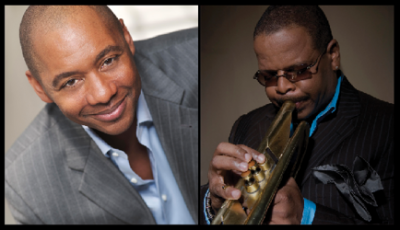 Coltrane’s A Love Supreme: Live in Amsterdam reissue from the Branford Marsalis Quartet out now and available on vinyl for the very first time Read more »
Coltrane’s A Love Supreme: Live in Amsterdam reissue from the Branford Marsalis Quartet out now and available on vinyl for the very first time Read more »
Branford Marsalis and Terence Blanchard @ Kennedy Center
Publication: DCist
Author: Sriram Gopal
Date: March 28, 2011
 The Kennedy Center presented a double bill on Saturday evening that showed two very different approaches to modern acoustic jazz. Saxophonist Branford Marsalis and trumpeter Terence Blanchard are both titans of the genre, with strong pedigrees in the musical traditions of New Orleans. Marsalis’s quartet adopted a less structured sound that was more adventurous and challenging, while Blanchard’s quintet dug more into the swing of things and offered more accessibility during its half of the two-and-a-half hour concert.
The Kennedy Center presented a double bill on Saturday evening that showed two very different approaches to modern acoustic jazz. Saxophonist Branford Marsalis and trumpeter Terence Blanchard are both titans of the genre, with strong pedigrees in the musical traditions of New Orleans. Marsalis’s quartet adopted a less structured sound that was more adventurous and challenging, while Blanchard’s quintet dug more into the swing of things and offered more accessibility during its half of the two-and-a-half hour concert.
Playing with his longtime pianist and bassist, Joey Calderazzo and Eric Revis, as well as young tyro Justin Faulkner on drums, the group explored the more fluid approach to meter and rhythm that Marsalis has been embracing for over a decade. Beginning with 1999’s Requiem, and in reaction to his exposure to classical influences like Wagner and late 19th Century Italian opera, Marsalis treats harmony and meter as both subjective and objective elements to music, where both are responsive to the melodic direction.
In a set that opened with an untitled composition by Calderazzo — and which also included a swinging interpretation of the Monk standard, “Teo” — much of the hour was devoted to this more open way of playing, with mixed results. Calderazzo’s ballad, “Hope,” showcased how powerful this type of interaction could be and was the highlight of the entire evening. Featuring the pianist’s beautiful classical touch, the song gave Marsalis’s soprano saxophone the opportunity to wring all of the emotion out of the haunting melody. What followed was a fifteen-minute crescendo that slowly built in intensity. While the harmonic movement was defined, the meter was not. The interaction among musicians was brilliant, and Faulker was impressive in coloring the music in absence of a firm groove. In contrast, Marsalis’s “Endymion” bordered on self-indulgent at times, as did the unaccompanied bass solo that opened the set closer, “Sammo.” While that song did re-introduce an element of groove, it was not enough to restore a sense of balance to the set overall.
Blanchard’s fiery quintet delivered a more “in-the-pocket” sound, built on the foundation established by dexterous drummer Kendrick Scott and talented young bassist Joe Sanders. Brice Winston’s rich tenor saxophone was under-utilized, but added depth whenever it was in the mix and provided a worthy counter to Blanchard’s cutting trumpet sound. Instead of adopting the more textured style that has made Blanchard a successful film composer, the group came to lay it down, going from 0 to 60 in seconds.
While most of the set was devoted to straight-ahead playing, albeit very syncopated and polyrhythmic, it was again a ballad which acted as the centerpiece for the set. After uptempo burners “Wandering Wanderer” and “Au Privave,” the calmness of Aaron Parks’ “Ashe” was introduced with a minimalist touch from pianist Fabian Almazan, a distinctive player for whom we should all keep an eye out. Built on repeated motifs and sparse construction, the lengthy opening drew the listener in and set the stage for the layered harmonies that came when the rest of the ensemble joined. Both Winston and Blanchard shined in their solos, while the rhythm section provided delicate support. After this memorable performance, the set closed with Blanchard’s “A Time To Spare,” which included an intense solo from Scott that drew cheers from the audience.
Categories
Tags in Tags
Branford Marsalis Branford Marsalis Quartet ellis marsalis four mfs playin' tunes Joey Calderazzo Justin Faulkner Marsalis Family marsalis music metamorphosen miguel zenon music redeems new orleansFilter by Artist
Marsalis Music Radio
Join Our Mailing List
- RT @bmarsalis: Compliments of the @T_Blanchard archives. https://t.co/4RsXbyEloa — 1 year 27 weeks ago MarsalisMusic